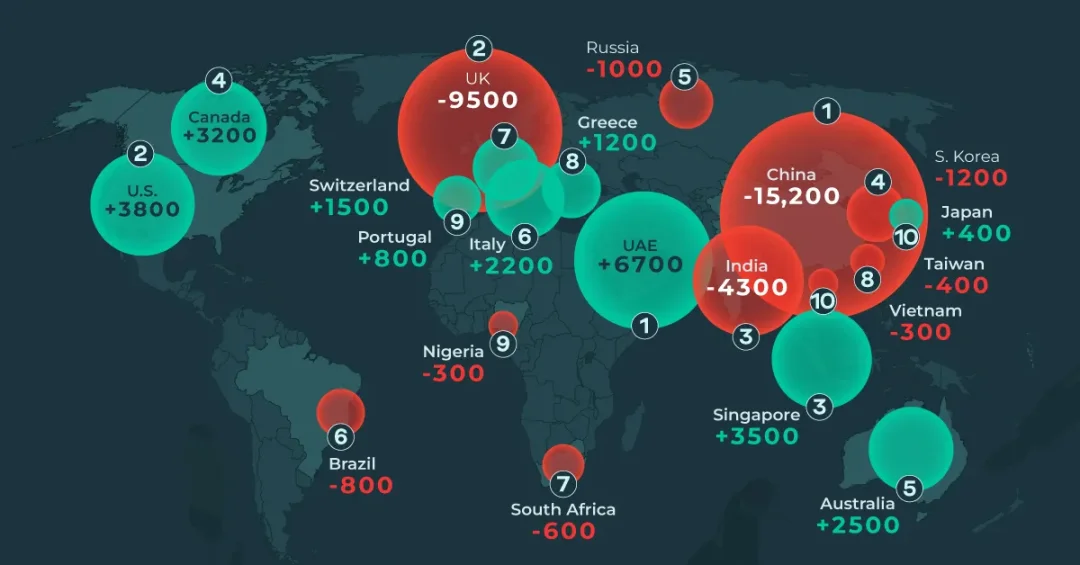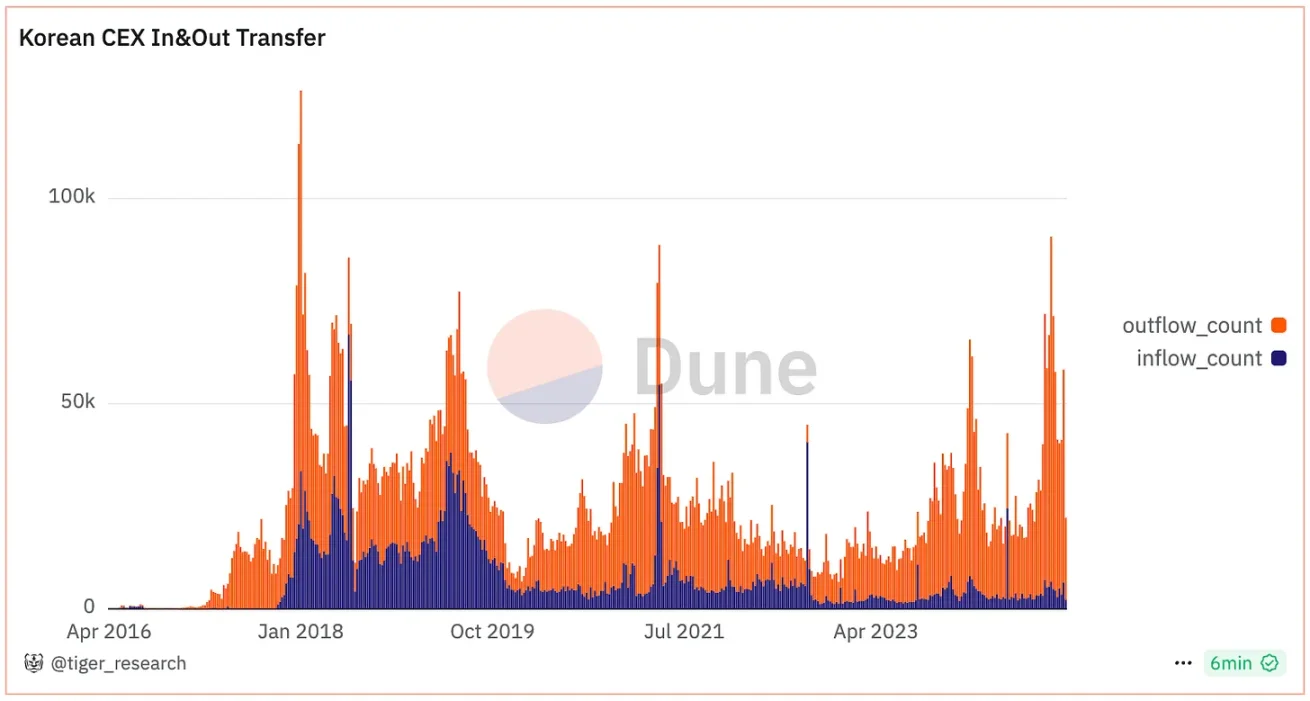South Korea's encryption escape: capital, enterprise and talent outflow

Reprinted from panewslab
01/25/2025·5MWritten by: Jay Jo, Yoon Lee, Tiger Research
Compiled by: Luffy, Foresight News
Main points
South Korea's high cryptocurrency trading volumes have attracted global attention, but regulatory ambiguity and a lack of guidelines have held back the industry.
The government prohibits the opening of real-name cryptocurrency trading accounts for businesses. This restriction, combined with a vague regulatory framework, has led to an exodus of talent, capital and business, weakening the competitiveness of the Web3 ecosystem.
As the global Web3 industry is expected to grow rapidly under the Trump administration, South Korea must reform regulatory policies to ensure the long-term sustainability of the industry.
1. Introduction
The inauguration of "Cryptocurrency-Friendly President" Trump and the establishment of the U.S. Securities and Exchange Commission (SEC) Encryption Task Force (Crypto 2.0 TF) will accelerate structural changes in the global Web3 market. This is a critical turning point. Talent, capital and businesses are likely to migrate to countries with robust regulatory frameworks, while outflows from countries with regulatory uncertainty will intensify.

Capital inflows/outflows of various countries in 2024, data source: Henry & Partners
South Korea is also part of this trend. Henry & Partners' Private Wealth Migration Report 2024 shows South Korea tops the list for high-net-worth immigration from Asia. Economic, social and cultural factors drive this migration wave. Although not directly related to the Web3 industry, these groups are often like canaries in the coal mine, signaling changes in a country's business environment.
Against this background, it is crucial to re-examine Korea's Web3 industry. This report explores the flow of capital, enterprise and talent in South Korea's Web3 market, as well as the key challenges the industry must address.
2. Capital outflows: offshore exchanges and accelerated on-chain
transfers
South Korea’s cryptocurrency market is growing rapidly. There are 15.6 million cryptocurrency investors holding $73 billion in assets. The average daily trading volume of cryptocurrency exchanges is now equivalent to the trading volume of the KOSPI and KOSDAQ combined. This reflects South Korean investors’ enthusiasm for crypto assets, driven by low stock market returns and political instability related to martial law.

However, recent outflows from crypto assets have reached worrying proportions. During the martial law period, major local exchanges experienced service outages, eroding trust in the stability of these platforms. At the same time, the diversified investment opportunities provided by foreign exchanges and decentralized finance (DeFi) further promote capital migration.
The South Korean Financial Services Commission's Virtual Asset Service Provider (VASP) Survey in the first half of 2024 showed that fund transfers to foreign VASP wallets increased 2.3 times year-on-year. On-chain data confirms this trend, showing that asset migration from local exchanges to foreign platforms continues to increase.
In the long term, capital migration may harm South Korea's Web3 industry. Transaction fees and service revenue flow abroad, reducing the competitiveness of local ecosystems and reducing investor protection. It has also raised concerns about falling demand for the won and increased volatility in its value.
3. Migration Wave: Moving Headquarters to Crypto-Friendly Countries
Korean Web3 companies are accelerating offshore migration. In 2024, Nexon’s blockchain arm Nexpace and Klaytn and Line Finschia’s Kaia Foundation moved to Abu Dhabi. WeMade's Wemix moves to Dubai. The Web3 industry is rapidly moving to countries with clearer and more favorable regulations.
South Korea faces many obstacles in promoting Web3-related businesses. Companies are unable to open corporate accounts for cryptocurrency trading, making it difficult to use crypto assets. This brings complexity to the realization of crypto assets and creates issues in accounting, taxation and business operations. For example, in the cryptocurrency payment business, Enterprise A may receive crypto assets from consumers and need to settle the payment with the seller in Korean won. Without a company account, liquidating assets is nearly impossible.
Although South Korea has established a regulatory framework, the lack of specific guidelines for stablecoins, DeFi and Web3 games has limited industry growth. The country's aggressive regulatory approach limits businesses that are not expressly licensed. In contrast, global markets benefit from regulatory sandboxes that support various demonstration projects.
The Trump administration's stance on cryptocurrencies is likely to highlight this difference, with favorable regulatory environments overseas accelerating the migration of Web3 companies from South Korea.
4. Brain drain: weakening the technical competitiveness of the Web3
industry
The relocation of Korean Web3 companies abroad may have a negative impact on the domestic Web3 talent pool. As companies relocate to countries with clearer and more favorable regulations, domestic job opportunities may decrease, leading to a brain drain. This may hinder the development of the domestic Web3 ecosystem.
Talent migration is not just a problem for the Web3 industry in South Korea. South Korea has one of the highest rates of migration of key talent to the United States, especially those with master's and doctoral degrees. This trend is particularly evident in the technology-reliant Web3 industry and could harm the industry's competitiveness.
In contrast, countries such as the United States and the United Arab Emirates have promoted the development of their Web3 industries through clear regulations and supportive policies. South Korea's unclear regulatory environment has accelerated brain drain, which poses a long-term threat to South Korea's technological competitiveness and industrial ecosystem.
5. Challenges and opportunities in the Korean Web3 market in 2025:
regulatory reform and industry growth
South Korea has attracted global attention for its cryptocurrency trading volume. However, this trading volume has not boosted the industry and made the country a liquidity conduit for global traders. This structure is not conducive to sustainable growth. South Korea urgently needs to make commercial and technological progress to strengthen the Web3 ecosystem.

Source: Arthur Hayes
Due to a lack of local innovation and regulatory uncertainty, South Korea is on the margins of global Web3 development. This over-reliance on transaction volume rather than ecosystem construction has led to the emergence of "Korean discounts" in the international market.
In 2025, significant changes are expected in the global industry as new governments take office. Amid these changes, South Korea is at a critical crossroads. Positive moves include allowing cryptocurrency operators to open corporate accounts, developing stablecoin regulations and advancing cryptocurrency legislation. However, these efforts only scratch the surface.
To make progress, South Korea must address risks, analyze global policy shifts, and develop a regulatory framework appropriate to domestic circumstances. South Korea must move from focusing solely on transaction volume to establishing a sustainable innovation center characterized by commercial excellence and technological leadership.
